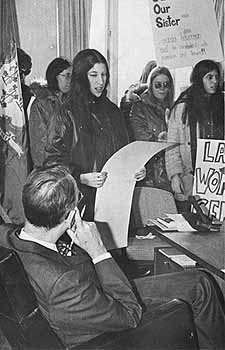|
This is an archived article.
For the latest news, go to the Advance
Homepage
For more archives, go to the Advance Archive/Search Page. |
||
|
A room, a desk, and a chair. With those scant resources, the UConn's Women's Center began in Room 201 of what was then known as the Commons Building (now Student Union-South). It was the fall of 1972. The Women's Center is now celebrating its 30th anniversary, with a series of events over the next two years, starting with this year's observance of Women's History Month in March. The idea of a campus organization for women began in 1969 with "a group of feminists who were interested in promoting feminist ideology and activism on campus," according to a review of the center's origins published in 1983.
"However," it continues, "no formal organizing was done until the spring of 1972 when the Free Women's Collective was formed. One of our primary objectives was to establish a Women's Center." That objective grew not only out of the burgeoning feminist movement on campus, but also from protests over sexism and gender discrimination that became part of the turbulent times of the late 1960s and 1970s. The Free Women's Collective was originally housed in Bishop Center, in office space provided by Elizabeth K. Roper, the director of Continuing Education in the early 1970s. Although it remained a separate organization for a while, when the Women's Center was established in the Commons Building, the Collective moved into the same 10-by-28-foot room. "The idea for a Women's Center was started last March by students and community members on and off campus," said then-volunteer Carol Logan, quoted in a September 1972 news article in the Connecticut Daily Campus. "Women need a place for identification and support." The 1972 Campus article also reported that the center offered "information to the community about daycare, abortion referrals, health care and pregnancy counseling, women's studies and women's activities in Connecticut." The activities for the year included newsletters, speakers, consciousness-raising groups, and talks in high schools, residence halls and sororities. One of the first major undertakings of the new Women's Center was a Women's Rally, held in late September 1972 in the Student Union Ballroom. Eighteen speakers "talked about the need for role models to encourage young women to continue in their careers and how women should not be held back by alleged University sexism in athletics, hiring practices or by teaching assistant attitudes," reported the Connecticut Daily Campus on Sept. 28, 1972. On Feb. 9, 1973, activists staged a protest, during which two dozen demonstrators occupied a room in Gulley Hall, presenting a list of demands dealing with women's rights, and the need for larger facilities. Later that spring, the Women's Center moved to a larger room in the Commons Building. More space was acquired when the Women's Center moved into a house on Gilbert Road in February 1974. But in November, fire destroyed the building and, after temporarily relocating to the old ROTC Building, the center moved to a house on Whitney Road. (An investigation determined the fire was caused by a faulty furnace.) As the Women's Center approached its third anniversary in the fall of 1975, the Willimantic Chronicle reported that "today, the Women's Center has credibility, a full-time director and assistant, and a constituency of undergraduate and graduate women, classified women and community women." At that time, there were 12 collectives under the auspices of the Women's Center, including Women in the Arts, a health collective, a Rape Crisis Center, and peer counseling. Then-assistant director Susan Weldon told the Chronicle in 1975, "As the Center has grown, we have sensed we were in danger of forgetting the lesson our history has taught us: that promoting broad active involvement in decision-making results in a strong organization and in personal growth." The lesson was not lost, however: Now the Women's Center is celebrating 30 years of involvement in the University community. |

